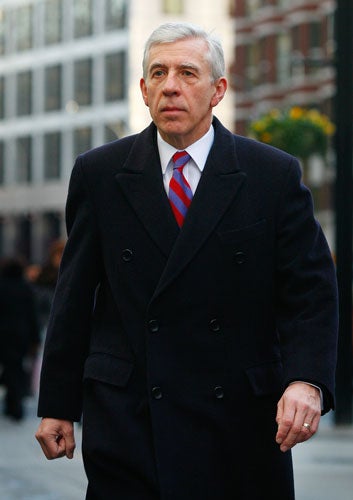Police officer says he was forced into bugging Muslim MP

Your support helps us to tell the story
From reproductive rights to climate change to Big Tech, The Independent is on the ground when the story is developing. Whether it's investigating the financials of Elon Musk's pro-Trump PAC or producing our latest documentary, 'The A Word', which shines a light on the American women fighting for reproductive rights, we know how important it is to parse out the facts from the messaging.
At such a critical moment in US history, we need reporters on the ground. Your donation allows us to keep sending journalists to speak to both sides of the story.
The Independent is trusted by Americans across the entire political spectrum. And unlike many other quality news outlets, we choose not to lock Americans out of our reporting and analysis with paywalls. We believe quality journalism should be available to everyone, paid for by those who can afford it.
Your support makes all the difference.A police officer last night claimed he was forced by the Metropolitan Police to carry out the bugging of a meeting in prison between Babar Ahmed, a terrorist suspect, and his MP, Sadiq Khan.
Mark Kermey, an intelligence officer at the Woodhill prison where the bug was placed in a table, said he was put under "significant pressure" by the Metropolitan Police to carry out the electronic eavesdropping on Ahmed, who was facing exradition on terrorism charges, during a social visit by the MP for Tooting, Mr Khan.
David Davis, the Shadow Home Secretary, said the disclosure raised some serious questions. "It suggests it goes wider than one police officer," said Mr Davis. The matter is certain to increase calls for a tightening of the surveillance rules.
Justice Secretary Jack Straw who has announced a two-week inquiry by Sir Christopher Rose, the Chief Surveillance Commissioner, said no minister had authorised the bugging of Mr Khan's private conversations at HMP Woodhill, near Milton Keynes, in May 2005 and June 2006.
MPs are worried that the claims, if true,contravene the doctrine adopted by former Prime Minister Harold Wilson that no MPs should be bugged, unless it is a matter of national security.
It is understood that the police officer, who is under investigation on another matter, authorised the eavesdropping, but had targeted Babar Ahmed, rather than the MP.
However, there were claims last night that the MP – who is a former chairman of the civil rights group Liberty – may have been monitored for years. There were also further reports of bugging within prisons.
Mr Straw confirmed that a chief officer of police could have authorised the eavesdropping operation under the existing rules. Under the 2000 Regulation of Investigatory Powers Act, he said eavesdropping can be authorised by a police chief without the permission of a minister if it takes place inside a prison. However, as he explained to MPs, normally a Secretary of State has to give authorisation for bugging suspects – the Home Secretary for bugging by the police, MI5 and Special Branch or the Foreign Secretary for bugging by MI6 and GCHQ.
Last night Imran Khan, a lawyer who has defended many suspects alleged to be involved in terrorism, wrote to Mr Straw calling for the Rose inquiry to be widened to find out whether solicitors' conversations with clients are routinely bugged. "In Belmarsh and Woodhill inmates feel these conversations are being monitored and what has happened in my career recently indicates that might be the case."
Shami Chakrabarti, director of Liberty, said: "Whatever happens this time – it's high time for simpler and stronger surveillance laws with warrants issued by judges, not policemen."
Scotland Yard said it refused to "discuss matters of national security."
Subscribe to Independent Premium to bookmark this article
Want to bookmark your favourite articles and stories to read or reference later? Start your Independent Premium subscription today.
Join our commenting forum
Join thought-provoking conversations, follow other Independent readers and see their replies
Comments